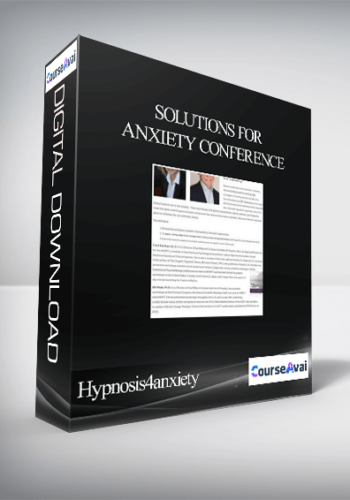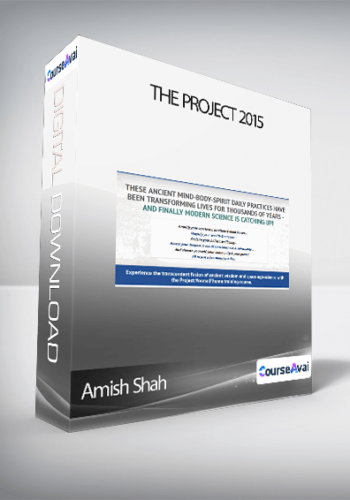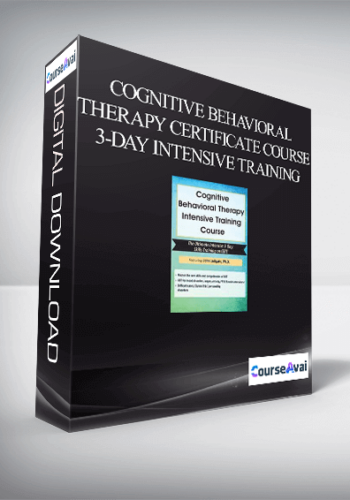[Audio] EP05 Point/Counterpoint 13 – Integration of Object Relations Theory with Attachment Theory and Neurobiological Development of the Self – James Masterson, M.D.
Original price was: $15.00.$4.50Current price is: $4.50.
[Instant Download] – Immediately deliver the download link after receiving the payment
Description
Unlock your potential with the Unlock your potential with the [Audio] EP05 Point/Counterpoint 13 – Integration of Object Relations Theory with Attachment Theory and Neurobiological Development of the Self – James Masterson, M.D.[Audio] EP05 Point/Counterpoint 13 – Integration of Object Relations Theory with Attachment Theory and Neurobiological Development of the Self – James Masterson, M.D. course for only course for only Original price was: $15.00.Original price was: $15.00.$$4.504.50Current price is: $4.50.Current price is: $4.50. at at Giolib.comGiolib.com! Explore our comprehensive library of over 60,000 downloadable digital courses across various ! Explore our comprehensive library of over 60,000 downloadable digital courses across various Medical & HealthMedical & Health. Get expert-led, self-paced learning at up to 80% savings. Elevate your skills today!. Get expert-led, self-paced learning at up to 80% savings. Elevate your skills today!
- Topic Areas:Topic Areas:
- Point/Counterpoint SessionPoint/Counterpoint Session
- Category:Category:
- Evolution of Psychotherapy | Evolution of Psychotherapy 2005Evolution of Psychotherapy | Evolution of Psychotherapy 2005
- Faculty:Faculty:
- James F. Masterson, MD | Erving Polster, PhDJames F. Masterson, MD | Erving Polster, PhD
- Duration:Duration:
- 1 Hour 18 Minutes1 Hour 18 Minutes
- Format:Format:
- Audio OnlyAudio Only
- Original Program Date :Original Program Date :
- Dec 10, 2005Dec 10, 2005
Description
Description:Description:
This talk first briefly reviews the history of the Developmental, Self and Object Relations theoretical approach to the personality disorders as a preface to exploring the latest additions to the theory, i.e., Attachment Theory and Neurobiological Development of the Self in the Right Brain. Attachment Theory: The work of Ainsworth and others is described leading to the attachment categories in the infant and the adult. Many follow-up studies are presented validating the persistence of the categories over time. Neurobiologic Development of the Self in the Right Brain: The work of Alan Schore, Ph.D. is used to describe the development of the self in the right prefrontal cortex of the brain. Integration: The integration of the two theories with the object relations approach are described and illustrated through therapeutic alliance and transference acting-out, and transference and countertransference. ·This talk first briefly reviews the history of the Developmental, Self and Object Relations theoretical approach to the personality disorders as a preface to exploring the latest additions to the theory, i.e., Attachment Theory and Neurobiological Development of the Self in the Right Brain. Attachment Theory: The work of Ainsworth and others is described leading to the attachment categories in the infant and the adult. Many follow-up studies are presented validating the persistence of the categories over time. Neurobiologic Development of the Self in the Right Brain: The work of Alan Schore, Ph.D. is used to describe the development of the self in the right prefrontal cortex of the brain. Integration: The integration of the two theories with the object relations approach are described and illustrated through therapeutic alliance and transference acting-out, and transference and countertransference. ·
Educational Objectives:Educational Objectives:
- To describe attachment theory within the context of the psychotherapy of personality disorders.To describe attachment theory within the context of the psychotherapy of personality disorders.
- To describe neurobiological development of the self in the right brain within the context of the psychotherapy of personality disorders. To describe neurobiological development of the self in the right brain within the context of the psychotherapy of personality disorders.
*Sessions may be edited for content and to preserve confidentiality**Sessions may be edited for content and to preserve confidentiality*
Faculty
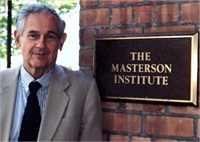
James F. Masterson, MD Related seminars and products: 50
James F. MastersonJames F. Masterson (M.D., Jefferson Medical School, 1951) was Director of the Masterson Group, P.C., which specializes in the treatment of adolescent and adult character disorders. Additionally, he was Director of the Masterson Institute (formerly Character Disorder Foundation); attending psychiatrist at New York Hospital, Payne Whitney Clinic; and Adjunct Clinical Professor of Psychiatry at Cornell University Medical College. Masterson has authored seven books and edited two volumes, mostly on the topic of psychoanalytic approaches to character disoreders and adolescents. His seminal work on the borderline personality has made him one of the most influential and studied practitioners of modern psychoanalytic methods. (M.D., Jefferson Medical School, 1951) was Director of the Masterson Group, P.C., which specializes in the treatment of adolescent and adult character disorders. Additionally, he was Director of the Masterson Institute (formerly Character Disorder Foundation); attending psychiatrist at New York Hospital, Payne Whitney Clinic; and Adjunct Clinical Professor of Psychiatry at Cornell University Medical College. Masterson has authored seven books and edited two volumes, mostly on the topic of psychoanalytic approaches to character disoreders and adolescents. His seminal work on the borderline personality has made him one of the most influential and studied practitioners of modern psychoanalytic methods.
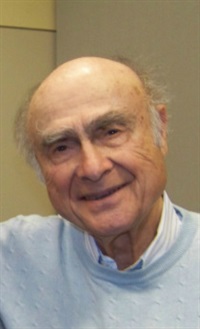
Erving Polster, PhD Related seminars and products: 132
Erving Polster, Ph.DErving Polster, Ph.D in clinical psychology, is the Director of The Gestalt Institute of San Diego, and the author of several important books, including Gestalt Therapy Integrated, Every Person's Life is Worth a Novel, and From the Radical Center: The Heart of Gestalt Therapy, as well as dozens of articles and chapters. Erving has authored 6 books. In his current writings, he offers perspectives and designs for a communal application of psychotherapy principles. He also describes and celebrates a powerful contemporary momentum for people-at-large to join together in the search for personal and social enlightenment. in clinical psychology, is the Director of The Gestalt Institute of San Diego, and the author of several important books, including Gestalt Therapy Integrated, Every Person's Life is Worth a Novel, and From the Radical Center: The Heart of Gestalt Therapy, as well as dozens of articles and chapters. Erving has authored 6 books. In his current writings, he offers perspectives and designs for a communal application of psychotherapy principles. He also describes and celebrates a powerful contemporary momentum for people-at-large to join together in the search for personal and social enlightenment.
Future-proof your knowledge with the Future-proof your knowledge with the [Audio] EP05 Point/Counterpoint 13 – Integration of Object Relations Theory with Attachment Theory and Neurobiological Development of the Self – James Masterson, M.D.[Audio] EP05 Point/Counterpoint 13 – Integration of Object Relations Theory with Attachment Theory and Neurobiological Development of the Self – James Masterson, M.D. course at course at GiOlibGiOlib! Enjoy lifetime access to high-quality digital content, crafted to advance your career and personal development.! Enjoy lifetime access to high-quality digital content, crafted to advance your career and personal development.
- Lifetime Access:Lifetime Access: Permanent access to all purchased courses. Permanent access to all purchased courses.
- Smart Savings:Smart Savings: Benefit from prices up to 80% off original course costs. Benefit from prices up to 80% off original course costs.
- Safe Transactions:Safe Transactions: Process your payments securely. Process your payments securely.
- Practical Insights:Practical Insights: Gain actionable skills relevant to today's demands. Gain actionable skills relevant to today's demands.
- Instant Availability:Instant Availability: Begin your course immediately after payment. Begin your course immediately after payment.
- Flexible Learning:Flexible Learning: Access content effortlessly on any device. Access content effortlessly on any device.
Start expanding your horizons with Start expanding your horizons with GiOlibGiOlib!!
![[Audio] EP05 Point/Counterpoint 13 - Integration of Object Relations Theory with Attachment Theory and Neurobiological Development of the Self - James Masterson, M.D.](https://giolib.com/wp-content/uploads/2023/04/Audio-Only-EP05-Point-Counterpoint-13-Integration-of-Object-Relations-Theory-with-Attachment-Theory-and-Neurobiological-Development-of-the-Self-James-Masterson-M.D.png)

